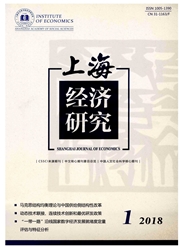

 中文摘要:
中文摘要:
从决定消费的经济逻辑出发,本文通过理论框架的构建分析了收入分配和人口结构对居民消费结构的影响机制,得到的理论假说是:(a)如果高收入类型居民对某商品的偏好强于低收入阶层,则收入差距的扩大对该商品的消费支出比例有正向的影响,否则有负向影响;(b)如果高收入类型居民对某商品的偏好强于低收入阶层,则高收入阶层人口比例的提高对该商品的消费支出比例有正向的影响,否则有负向影响。为了对该理论假说进行实证检验,我们首先利用面板分位数回归方法证实了我国城乡居民消费偏好存在显著的差异,接着利用非参数可加模型分析了城乡收入差距和人口结构与居民消费结构的关系,实证结果证实了理论假说。基于理论和实证分析结果,文章最后提出了缩小我国城乡收入差距、加快人口城市化进程等优化消费结构的政策建议。
 英文摘要:
英文摘要:
From the economic logic of consumption decisions, this paper builds a theoretical framework to analyze the mechanism how the income distribution and population structure affect the structure of household consumption. We obtain some theoretical hypothesis as follows: (a) If the type of high-income residents have stronger preferences on some goods than the type-of low-income residents, then the widening income gap between the two types of residents should have a positive impact on expenditure proportion of this goods, otherwise will have a negative impact. (b) If the type of high- income residents have stronger preferences on some goods than the type of low-income residents, then the increase in the proportion of population of high-income residents should have a positive impact on expenditure proportion of this goods, otherwise will have a negative impact. To take an empirical test on the above theoretical hypothesis, we firstly confirm that urban and rural residents' consumption preferences are significant differences using panel data quantile regression model, and then use non- parametric additive model to analyze the relation between urban-rural income gap, population structure and consumption structure. Empirical results verify the theoretical hypothesis. Based on the results of theoretical and empirical analysis, this paper finally proposes two policy recommendations for improving the structure of consumption : narrow the income gap between urban and rural household and speed up the urbanization process.
 同期刊论文项目
同期刊论文项目
 同项目期刊论文
同项目期刊论文
 期刊信息
期刊信息
